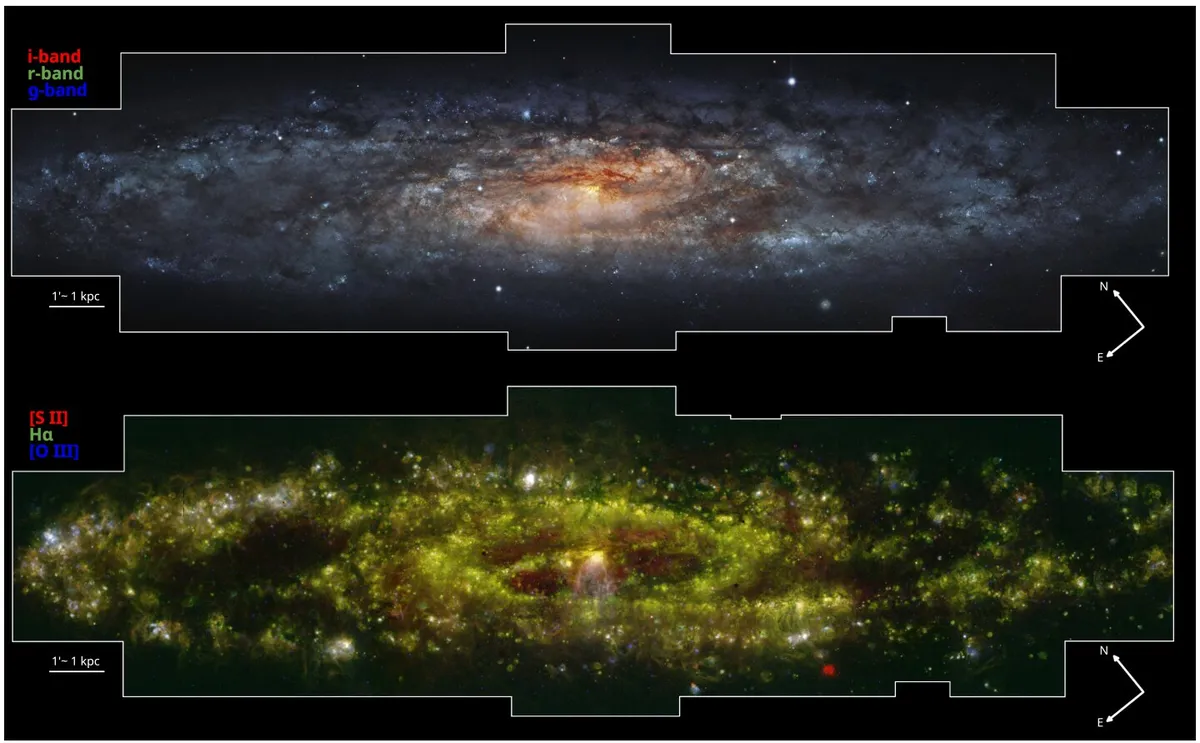
Astronomers have recently achieved a galactic masterpiece with the creation of an ultra-detailed image that showcases previously unseen features of the Sculptor Galaxy. Utilizing the European Southern Observatory's Very Large Telescope (ESO's VLT), researchers observed this nearby galaxy in thousands of colors simultaneously. By capturing vast amounts of data from every single location, they have produced a comprehensive galaxy-wide snapshot of the lives of stars within the Sculptor Galaxy.
Galaxies are incredibly complex systems, and our understanding of them is still evolving. According to ESO researcher Enrico Congiu, who led a groundbreaking study published in Astronomy & Astrophysics, the evolution of galaxies relies heavily on processes happening at much smaller scales. The Sculptor Galaxy, located approximately 11 million light-years from Earth, is in a unique position. Congiu explains, “It is close enough that we can resolve its internal structure and study its building blocks with incredible detail, but it is also large enough that we can still perceive it as a complete system.”
A galaxy’s building blocks—stars, gas, and dust—emit light at different wavelengths, creating a spectrum of colors. The more shades captured in an image of a galaxy, the deeper our understanding of its inner workings becomes. Conventional images typically include only a limited number of colors; however, this new map of the Sculptor Galaxy comprises thousands of colors. This extensive range of colors provides astronomers with critical information about the stars, gas, and dust within the galaxy, including their age, composition, and motion.
To create this detailed map of the Sculptor Galaxy, researchers invested over 50 hours of observation using the Multi Unit Spectroscopic Explorer (MUSE) instrument on ESO's VLT. The team meticulously stitched together more than 100 exposures to cover an area of the galaxy measuring approximately 65,000 light-years wide. According to co-author Kathryn Kreckel from Heidelberg University, this map serves as a potent tool for research. “We can zoom in to study individual regions where stars form at nearly the scale of individual stars, but we can also zoom out to study the galaxy as a whole,” Kreckel states.
In their initial analysis of the data, the team identified around 500 planetary nebulae within the Sculptor Galaxy. These regions of gas and dust are expelled from dying sun-like stars. Co-author Fabian Scheuermann, a doctoral student at Heidelberg University, emphasizes the significance of this finding: “Beyond our galactic neighborhood, we usually encounter fewer than 100 detections per galaxy.” The identification of these planetary nebulae is crucial, as they serve as distance markers to their host galaxies. According to Adam Leroy, a professor at The Ohio State University and a co-author of the study, “Finding the planetary nebulae allows us to verify the distance to the galaxy—a critical piece of information on which the rest of the studies of the galaxy depend.”
The newly created map of the Sculptor Galaxy opens avenues for future projects that will explore the dynamics of gas flow, its compositional changes, and the processes of star formation across this galaxy. Congiu remarks, “How such small processes can have such a big impact on a galaxy whose entire size is thousands of times larger is still a mystery.” This ongoing research promises to deepen our understanding of not just the Sculptor Galaxy, but the fundamental mechanisms that govern galaxy formation and evolution throughout the universe.